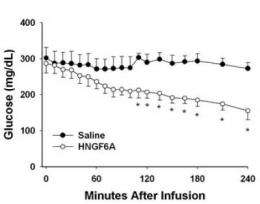Peptide linked to glucose metabolism and neuronal cell survival (w/ Video)

A cellular protein that may prevent nerve cells from dying also helps to improve insulin action and lower blood glucose levels, according to a study by researchers at Albert Einstein College of Medicine of Yeshiva University in collaboration with scientists at University of California, Los Angeles.
The study, which focuses on diabetic rodents, appears this month in PLoS One and is the first to show a role in glucose metabolism for humanin, a small protein (peptide). The researchers also demonstrated that humanin resembles the peptide leptin by acting on the brain to influence glucose metabolism.
Humanin is found in mitochondria — structures that populate the cytoplasm of cells and provide them with energy. The peptide was first detected in brain nerve cells in 2001, and subsequent studies suggest that it protects nerve cells from death associated with Alzheimer's and other brain disease.
"This new role of humanin in glucose metabolism, in addition to its role in Alzheimer's disease, is very intriguing since scientists have long proposed a link between type 2 diabetes and Alzheimer's disease," says Nir Barzilai, M.D., a co-senior author of the study, the Ingeborg and Ira Leon Rennert Professor of Aging Research, and director of the Institute for Aging Research at Einstein. "Humanin could turn out to be a therapeutic option for two common debilitating diseases that affect millions of people. Additionally, humanin may help treat other age-related diseases."
In the study, Dr. Barzilai and his colleagues infused humanin into the brains of diabetic rats to determine the peptide's effect on glucose metabolism. The infused humanin significantly improved overall insulin sensitivity, both in the liver and in skeletal muscle. Furthermore, a single treatment with a highly-potent form of humanin significantly lowered blood-sugar levels in diabetic rats.
"The improvement in insulin sensitivity caused by centrally administered humanin may be one of the main mechanisms through which humanin regulates cell survival," says Dr. Barzilai. "This may provide another potential mechanism by which humanin protects against Alzheimer's disease."
Humanin's possible link to two age-related diseases — Alzheimer's disease and type 2 diabetes — prompted the researchers to investigate whether age-associated changes in humanin levels occur in rodents and in humans. They found that humanin levels in two brain structures (the hypothalamus and the cortex) and in skeletal muscle decreased with age in rodents, and that circulating blood levels of the peptide decreased with age in people.
"From these results, we conclude that the decline in humanin with age could help explain why Alzheimer's disease and type 2 diabetes are more common in older people," says Dr. Barzilai.
Furthermore, "the remarkable activity of this novel peptide proposes a new role for an emerging class of endogenous molecules derived from the mitochondria that have previously been overlooked and can potentially represent a different paradigm for drug development for a variety of diseases," says Dr. Pinchas Cohen, co-senior author, professor and chief of endocrinology at the Mattel Children's Hospital UCLA, and co-director of the UCSD/UCLA Diabetes/Endocrinology Research Center at the David Geffen School of Medicine at UCLA.
The researchers are currently studying the pharmacokinetics and safety profile of humanin and its analogues.
Source: University of California - Los Angeles
















